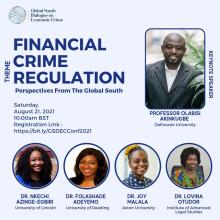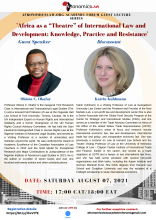Stand-Alone Posts
Global South Dialogue on Economic Crime Inaugural Conference themed "Financial Crime Regulation: Perspectives from the Global South"
August 6, 2021
Global South countries continue to lose an immeasurable, though, significant amount of funds yearly to illicit financial flows (IFFs), notwithstanding improvements in global regulatory structures aimed at curbing financial crime. Consequently, it is critical to examine whether the current global regulatory framework is best suited to effectively combat financial crime in the Global South.
NEWS: 8.6.2021
Afronomicslaw.org Academic Forum Guest Lecture Series: Africa as a "Theatre" of International Law and Development: Knowledge, Practice and Resistance
August 5, 2021
The Afronomicslaw.org Academic Forum invites you to join their next guest lecture series.
Title
Africa as a “Theatre” of International Law and Development: Knowledge, Practice and Resistance
Date: Aug 7, 2021
Time: 17:00 CAT/ 18:00 EAT
Call for Application: Legal or Policy Researcher Position at the Columbia Centre on Sustainable Investment (CSSI)
August 4, 2021
Legal or Policy Researcher Position
Call for Application: Lecturer in Commercial Law (Competition Law) at the University of Manchester
August 3, 2021
The Law department sits within the School of Social Sciences and is internationally recognised for pursuing high quality research across all areas of Law and delivering excellent teaching to undergraduate and postgraduate students. To further strengthen our research and teaching portfolio, in line with our strategic objectives, the School wishes to appoint a Lecturer in Commercial Law (Competition Law). This post will be available from 1 September 2021.
Pathways to Just, Equitable and Sustainable Trade and Investment Regimes
ADR Section of the African Bar Association presents an online Webinar themed "African Continental Free Trade Agreement (AfCFTA) and ADR: Challenges and Expectations"
August 2, 2021
Edward F. Luke II and John Ohaga will present at an Online Webinar hosted by the ADR Section of the African Bar association: “African Continental Free Trade Agreement AFCFTA and ADR: Challenges and Expectations”
Date: 2 August 2021
Time: 2pm West Africa Time (9 a.m. Eastern),
Zoom Meeting ID: 8968649 4750;
The Lagos Chamber of Commerce International Arbitration Centre (LACIAC) presents Africa Energy Arbitrators' Forum Preliminary Training and Competition, 2021
August 2, 2021
The AEA-Prelim Training and Competition 2021

